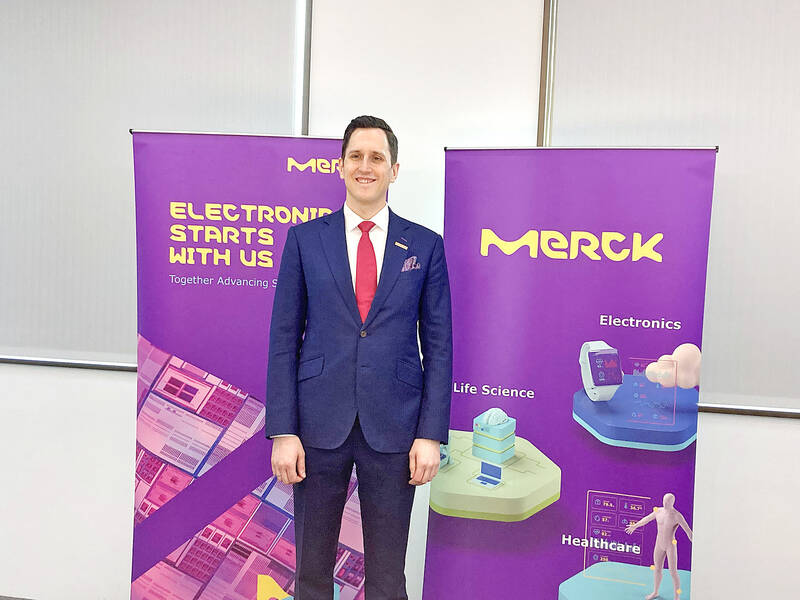Merck Group is mulling augmenting the local supply of some specialty gases and new materials to align with Taiwanese customers’ advance toward cutting-edge semiconductor technologies and artificial intelligence (AI)-related technologies, a company executive said.
As Taiwan is driving technological innovation in the global logic chip segment, Taiwanese firms would require large quantities of chemicals such as hydrochloric acid (HCL), as well as new materials, probably in the next five or seven years, Benjamin Hein, head of Merck’s specialty gases division, told reporters in Taipei on Monday.
“So, this is when we then decide we need to do something about this,” Hein said.

Photo: Lisa Wang, Taipei Times
Merck, headquartered in Darmstadt, Germany, is planning to invest 500 million euros (US$544.14 million) to expand capacity in Taiwan in the next few years, accounting for a major portion of the company’s 3 billion euro “Level Up” global growth program for its electronics business. In Taiwan, Merck last year launched its first-stage investment by building a site in Kaohsiung.
Regarding advanced new process technology, such as high-NA extreme ultraviolet lithography (EUV) tools, which are used to make the most advanced chips, customers would need new photo-resistant materials and different formulated products, Hein said.
Commenting on the demand profile from AI technology, Hein said the innovation comes mostly from the advanced packaging side, adding that one of the issues is how to integrate high-bandwidth-memory (HBM) chips into a logic chip on the same semiconductor device.
A majority of Nvidia Corp’s chips are made in Taiwan, Hein said.
Advanced logic chips and advanced memory chips would require more of certain types of products, he said. For instance, as advanced memory chips are stacking layers, they would require more dopants and HCL used in etching to clean the structure, he said.
The materials used in the manufacturing process of advanced chips are Merck’s focus, as those products would be the main growth drivers for the company over the next two decades, he said.
It is easy to justify Merck’s investment in Taiwan as it is the world’s biggest semiconductor material market and would safeguard that top position over a long period, as TSMC and other semiconductor companies are to continue investing in manufacturing capacity here, despite the US and Europe stepping up efforts to build local chip capacity, Hein said.
“Our ambition is not to be localizing everything in every country because that will be highly inefficient. We cannot be competitive. So we try to use our network around the world to support our customers wherever they go,” he said.
If not localized, Merck would not be able to successfully work with very demanding customers in the semiconductor industry, given the industry’s faster innovation cycles, he said.

Semiconductor business between Taiwan and the US is a “win-win” model for both sides given the high level of complementarity, the government said yesterday responding to tariff threats from US President Donald Trump. Home to the world’s largest contract chipmaker, Taiwan Semiconductor Manufacturing Co (TSMC, 台積電), Taiwan is a key link in the global technology supply chain for companies such as Apple Inc and Nvidia Corp. Trump said on Monday he plans to impose tariffs on imported chips, pharmaceuticals and steel in an effort to get the producers to make them in the US. “Taiwan and the US semiconductor and other technology industries

SMALL AND EFFICIENT: The Chinese AI app’s initial success has spurred worries in the US that its tech giants’ massive AI spending needs re-evaluation, a market strategist said Chinese artificial intelligence (AI) start-up DeepSeek’s (深度求索) eponymous AI assistant rocketed to the top of Apple Inc’s iPhone download charts, stirring doubts in Silicon Valley about the strength of the US’ technological dominance. The app’s underlying AI model is widely seen as competitive with OpenAI and Meta Platforms Inc’s latest. Its claim that it cost much less to train and develop triggered share moves across Asia’s supply chain. Chinese tech firms linked to DeepSeek, such as Iflytek Co (科大訊飛), surged yesterday, while chipmaking tool makers like Advantest Corp slumped on the potential threat to demand for Nvidia Corp’s AI accelerators. US stock

The US Federal Reserve is expected to announce a pause in rate cuts on Wednesday, as policymakers look to continue tackling inflation under close and vocal scrutiny from US President Donald Trump. The Fed cut its key lending rate by a full percentage point in the final four months of last year and indicated it would move more cautiously going forward amid an uptick in inflation away from its long-term target of 2 percent. “I think they will do nothing, and I think they should do nothing,” Federal Reserve Bank of St Louis former president Jim Bullard said. “I think the

Cryptocurrencies gave a lukewarm reception to US President Donald Trump’s first policy moves on digital assets, notching small gains after he commissioned a report on regulation and a crypto reserve. Bitcoin has been broadly steady since Trump took office on Monday and was trading at about US$105,000 yesterday as some of the euphoria around a hoped-for revolution in cryptocurrency regulation ebbed. Smaller cryptocurrency ether has likewise had a fairly steady week, although was up 5 percent in the Asia day to US$3,420. Bitcoin had been one of the most spectacular “Trump trades” in financial markets, gaining 50 percent to break above US$100,000 and